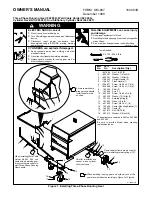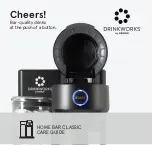
[6]
•
Keep a fire extinguisher readily available.
•
Empty containers, tanks, drums, or pipes which have
combustibles before perform welding.
•
Apply correct fuses or circuit breakers. Do not Remove stick
electrode from electrode holder or cut off welding wire at contact
tip when not in use.
•
Oversize or bypass them.
Cylinder can
explode if
damaged.
•
Pressure gas cylinders contain gas under high pressure. If
damaged, a cylinder can explode. Since gas cylinders are
normally part of the welding process, be sure to treat them
carefully.
•
Cylinders should be located away from areas where they may be
struck or subjected to physical damage. Use proper equipment,
procedures, and sufficient number of persons to lift and move
cylinders.
•
Always install cylinders in an upright position by securing to a
stationary support or cylinder rack to prevent falling over or
tipping.
•
Keep a safe distance from arc welding or cutting operations and
any other source of heat, sparks, or flame.
•
No touching cylinder by welding electrode, electrode holder or
any other electrically
―hot‖
parts. Do not drape welding cables or
welding torches over a gas cylinder.
•
Use only correct compressed gas cylinders, regulators, hoses,
and fittings designed for the process used; maintain them and
associated parts in good condition.
•
Use only compressed gas cylinders containing the correct
shielding gas for the and properly operating regulators designed
for the gas and pressure used. All hoses, fittings, etc. should be
suitable for the application and maintained in good condition.
•
Open the cylinder valve slowly and keep your head and face
away from the cylinder valve outlet.
•
Valve protection caps should be kept in place over valve expect
when the cylinder is in use or connected for use.
Hot parts can
burn
•
Do not touch hot parts with bare hand or skin.
•
Ensure equipment is cooled down before perform any work.
•
If touching hot parts is needed, use proper tools and/or wear
heavy, insulated welding gloves and clothing to prevent burns.
Flying metal
or dirt can
injure eyes
•
When welding, chipping, wire brushing, and grinding can cause
sparks and flying metal. It can hurt your eyes.
•
Remember wear appropriate safety glasses with side shields
when in welding zone, even under your welding helmet.
Summary of Contents for SI-TIG-300
Page 31: ... 28 9 TIG WELDING TORCH DETAILS ...
Page 32: ... 29 ...
Page 33: ... 30 10 ARGON FLOWMETER REGULATOR DETAILS ...
Page 34: ... 31 ...










































